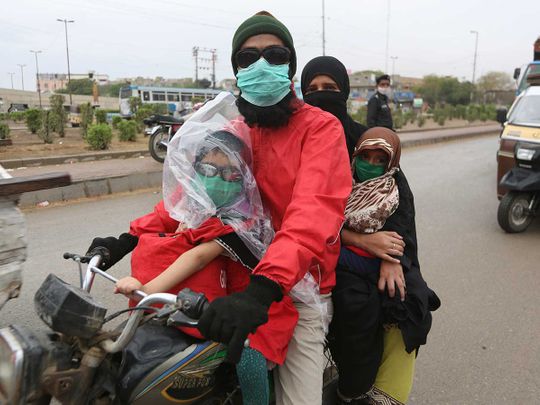
The creation of a national volunteer force called ‘Corona Relief Tigers’ was among the raft of measures announced Pakistan’s Prime Minister Imran Khan on Friday to tackle the coronavirus pandemic that has affected more than 195 countries including Pakistan. Yet these measures seem inadequate.
Last week when Pakistan was forced into a lockdown, the government appeared to have failed in handling the unprecedented crisis beyond mere lip service. Broadly speaking, the challenge requires urgent measures on two inter-related fronts.
On one hand, Imran and the government must be prepared to tackle the economic fallout since most commercial activities across the country have come to a halt. There are obvious gaps in the steps required to block the virus from spreading across Pakistan.
For instance, creation of the Corona Relief Tigers appears to be aimed at expanding the relief activities at the grassroots level. The network will identify people in urgent need of food and basic commodities, and ensure quick deliveries right at their doorsteps.
Imran can’t afford to get this wrong. At stake is not just his political future and legacy, but the future of Pakistan and its people. The prime minister has to choose wisely.
But with the coronavirus rapidly spreading, the country doesn’t have the time to create a new force, make it work and then decide if it was worthwhile to undertake the initiative. On the contrary, Pakistan has a large network of non-profit organisations waiting to be tapped for an urgent national response to the crisis. In times of adversity, non-profit groups in Pakistan have always come to the aid of the government and other relief agencies.
Likewise, Imran and his economic team appear determined to continue taking Pakistan through tough conditions attached to a $6 billion IMF loan programme. But with the extraordinary fallout from the coronavirus crisis, it is imperative that Pakistan must consider putting its terms with the IMF on hold till the situation normalises. In recent months, a popular lament heard across Pakistan was over the rapid increases in the tariff for electricity and gas.
Those increases were among the conditions accepted by Pakistan for the IMF loan. But faced with the virus crisis, Pakistan can ill-afford to continue with an unpopular belt-tightening exercise. As the restrictions continue, it’s very clear that low-income Pakistanis, in particular, are únable to bear the IMF-imposed financial burden, especially as the country’s daily work momentum is effectively suspended.
All parties should come together
On the other hand, Imran’s ability to steer Pakistan politically through this crisis has raised some compelling questions. At critical junctures in Pakistan’s history, the country’s ruling structure and opposition parties have always set aside their partisan differences and rallied around the cause at hand.
Such memorable occasions include the 1998 nuclear tests carried out by Pakistan, the large death toll from the devastating earthquake of 2005 and the 2014 attack on the army public school in Peshawar which prompted a large scale military campaign against the Taliban in Pakistan’s region along the Afghan border.
In sharp contrast to the mood of yesteryears, Imran has so far shown little interest in reaching out to leaders of the opposition parties to garner support for a national policy framework. This should have been the priority ahead of the disruptive lockdown which can potentially damage Pakistan’s economic outlook in the near term. Imran’s ‘go-it-alone’ approach has heightened the risk to his political future especially if conditions deteriorate in the coming weeks.
more on the topic
- Pakistan Prime Minister Imran Khan launches new App for Islamabad residents
- Coronavirus: Pakistan announces massive Rs1.25 trillion package to address COVID-19 challenges
- In the time of coronavirus, Pakistan’s media is playing politics-politics
- Pakistan likely to get IMF support to fight economic stress from COVID-19
- Coronavirus spreads through already struggling Pakistan
Other key elements of Pakistan’s wider societal framework have also been neglected.
Any attempt to forge national unity must include Pakistan’s civil society, including non-profit organisations or NPOs. Following the 2005 earthquake, such entities played an indispensable role in the frontlines to provide emergency relief to the worst-hit areas. Unless Imran sets aside his own preferences in favour of a higher national cause, his future and that of Pakistan will remain tragically at risk.
Meanwhile, the Corona Relief Tigers force is still in its formative phase. The idea deserves to be shelved until the government has exhausted all other tried and tested options dedicated to providing relief during periods of turmoil.
Pakistan can draw comfort from having a relatively less number of casualties than many other developed countries. But there can be no room for complacency as Pakistan like the rest of the world confronts this unprecedented health crisis. Imran can’t afford to get this wrong. At stake is not just his political future and legacy, but the future of Pakistan and its people. The prime minister has to choose wisely.
— Farhan Bokhari is a Pakistan-based commentator who writes on political and economic matters.










